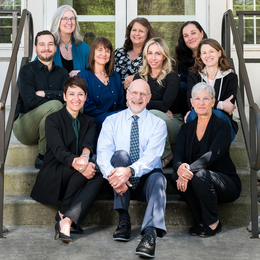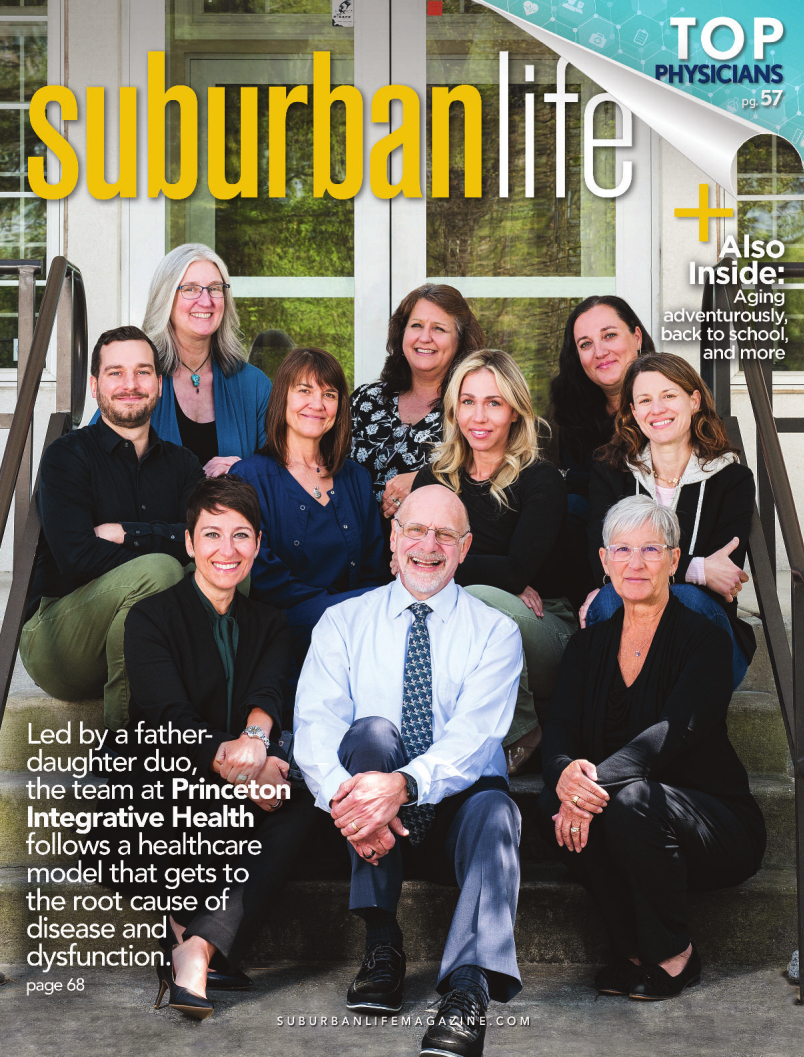
Feeling Better, Living Better
Led by a father-daughter duo, the team at Princeton Integrative Health follows a healthcare model that gets to the root cause of disease and dysfunction.
For the past six years, Princeton Integrative Health (PIH) has been at the forefront of changing the narrative about how health care is delivered in the United States. PIH utilizes a unique approach that focuses on getting to the root cause of disease and dysfunction—not simply treating symptoms—to help patients not only feel better but also live better.
That philosophy in itself makes for an interesting story, but dig a little deeper into how its two founders arrived at this way of thinking, and the story becomes truly fascinating. A mother’s intuition and longing to protect her child, combined with a father’s willingness to support his daughter and to embrace a different medical model, provided the inspiration for this influential partnership.
It all began when Jenna Richardson, CEO and Clinical Director at PIH, was a new mom to her son, Carter, who was struggling with some unidentified health challenges at just six months old. As she and her husband sought to have his health issues resolved, they were shuttled from doctor to doctor, who recommended medication after medication. When Richardson went to fill one of the prescriptions, which came from a prominent gastroenterologist, the pharmacist pulled her aside and explained that it could cause fatal respiratory problems for a child his age.
“That’s when I started to do my own personal research and realized there was this whole other world of root-cause medicine that existed, but just wasn’t mainstream,” Richardson says. “I started to realize how broken the conventional medical model was, with the process of symptom, disease, prescription. My desire was to get my son well, which he is—he’s now nine years old and thriving—but also to truly shift the paradigm of the current-state medical model of sick care to one of truly empowering people to take control of their health and well-being.”
Richardson had grown up as the daughter of a doctor and a nurse. She even started pre-med at Cornell University before shifting gears and entering the world of international business and management consulting, which she did for nearly 20 years. After her son’s ordeal, she became passionate about the concepts of functional medicine and integrative health. She reached out to her father, Vincent Leonti, M.D., with the idea of starting a practice based on preventing and reversing illness by supporting the body’s natural healing abilities.
Dr. Leonti was not only intrigued because of what his grandson went through, but also because he had suffered from heart disease despite being a physically active marathon runner who followed a good diet. When nobody in conventional medicine could give him a reasonable explanation for his issues other than “family history,” he decided a change might be welcome.
“I never would have gotten into it without Jenna,” says Dr. Leonti, PIH’s Medical Director. “It wasn’t until my grandson started to have some health issues, and Jenna started going down the path of nutrition and functional medicine, that she told me there was a different way of doing things than conventional medicine—a holistic way in which nutrition and lifestyle could be used as tools to make people healthier. She urged me to explore this, so I decided to take a course at the Institute for Functional Medicine. Coming out of that first week-long intensive, I felt totally empowered; after 30 plus years of practicing medicine, I finally had the tools to help people get well, not just manage their illness.”
PIH, which opened in January 2017, sees patients of all ages, whether they are already presenting with a diagnosis or symptoms from a certain health challenge, or are seeking to proactively take control of their wellness. While conventional healthcare providers spend an average of about seven minutes with each patient, PIH’s team spends 60 to 90 and dives into family history as well as the three main areas that lead to disease: deficiency, toxicity, and trauma. They also want to understand the patient’s emotional and mental health, striving to create harmony and balance throughout the body so that it can function optimally.
“This has really become a comprehensive wellness center and there’s almost no problem that we cannot aid people with in some way, because of all the different modalities that we have and the knowledge that we’ve accumulated,” Dr. Leonti says. “I feel like when I started here, I went back to medical school all over again, but this time I’ve really learned something useful and things that are really helping people rather than just putting a Band-Aid on the issue. People are getting truly well here.”
While committing to functional and integrative medicine, PIH has not turned its back on conventional medicine.
“We understand that at certain times medication is necessary; we’re not opposed to that, but we’re also very attuned to the fact that the body desires to be innately healthy, so we do all of the things necessary to provide the foundational elements of health,” Richardson says. “Those things are lifestyle factors, stress mitigation, proper nutrition and hydration, mental and emotional health and well-being, proper sleep, digestion, and detoxification.”
PIH strives to create empowerment for its patients by acting with integrity, using modalities that are innovative, and producing meaningful and measurable impact. Some of the services it provides in-house include hyperbaric oxygen therapy, IV nutrient therapy, ozone therapy, and cold laser therapy, and the staff will often recommend supplemental therapeutics such as chiropractic care and acupuncture. They also offer lifestyle and nutrition coaching, and Dr. Leonti notes that patients are much more receptive to them here than at his previous, conventional practice.
“It’s night and day,” he says. “It’s a breath of fresh air for me after working in the conventional medical system for all those years. I’m glad I did it when I did, and I wish I had done it 10 or 20 years earlier. It’s been a great journey.”
Dr. Leonti adds that this is his “legacy project,” and the shared hope between he and his daughter is that patients will take the tools they are learning and use them for their own lives, as well as pass them on to future generations.
“It’s not just the people we’re reaching on a day-to-day basis here, but it’s their families, it’s their friends, it’s their communities,” Richardson says. “It’s creating a ripple effect that they’re taking out into the world and sharing with others.
“We see the majority of our patients truly get well, and it’s such a rewarding process to have folks walk out of here a better version of themselves than when they came in, and oftentimes that’s physically, physiologically, mentally, and emotionally. We’re blessed to be able to see people’s lives transformed.”
Princeton Integrative Health
134 Franklin Corner Road, Suite 106
Lawrenceville, NJ 08648
(609) 512-1468
PrincetonIH.com
134 Franklin Corner Road, Suite 106
Lawrenceville, NJ 08648
(609) 512-1468
PrincetonIH.com
Photo by Jeff Anderson
Published (and copyrighted) in Suburban Life, August 2023.



